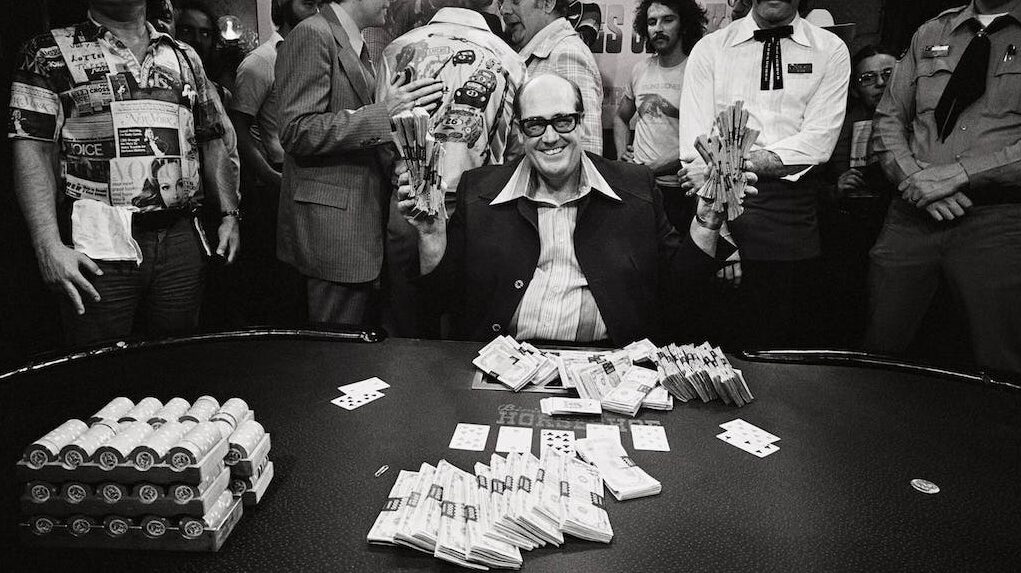
The word “legend” gets overused, but it certainly fit Doyle Brunson.
Arguably the most famous poker player of all time, Brunson died over the weekend at 89. He started out before poker was legal, playing in back rooms of bars, restaurants, and clubs. Later, when the game went legit in Las Vegas, he spent decades playing for big money against some of the other best players in the world. He wrote the “Super System” books, revealing key strategies on how to win several varieties of poker by playing aggressively. He knew them well enough to earn ten World Series Of Poker bracelets playing Texas Hold’em, including Razz, Deuce-To-Seven Draw, Seven-Card Stud, and HORSE.
Two of those victories were in the WSOP Main Event in 1976 and 1977. In both years, in the final hand, Doyle had a ten and a deuce, one of the worst starting hands imaginable. But they held up, making him a back-to-back champion, and that combination of cards was forever known thereafter as “The Doyle.” Yesterday, when I shared the news of his death with my friend Stuart Snyder, he replied:
No one should ever play 10-2 again (they never should have to begin with). The hand, like famous players’ numbers, should be retired.
Unfortunately, I never got to interview Brunson. When I was doing The Final Table Poker Show with Dennis Phillips from 2009 to 2012, we tried to convince Doyle to be our guest, but he wasn’t interested in talking. Word came back to us that by then he was tired of telling the stories of his life. But when we had his buddy Amarillo Slim Preston on the show (you can listen to that conversation here), he told us about a proposition bet the two had made.
In his senior years, Doyle got around on one of those four-wheel mobility vehicle, a Rascal scooter — always at top speed. I remember several times playing in a mid-stakes game at the the Bellagio while Doyle was in Bobby’s Room, where the cream of the crop played high-stakes poker. When he emerged — regardless of whether he’d won or lost — he’d come tearing through the poker room on his scooter, and it was up to you to get out of his way or risk the consequences.
Slim, who was always looking for an angle, decided to challenge his old friend to a scooter race. The two would have a course set up just outside the Amazon Room in the hallway of the Rio — the casino that used to be home to the WSOP — and whoever crossed the finish line in the shortest amount of time would win $20,000.
It just so happened that we recorded our Final Table Show interview with Slim earlier that day. When I pressed him for details on how he would rig the race, he blanched at my use of the word “rig.” Then he added, “but I did make sure the last leg of the course runs uphill.” Since Doyle easily outweighed Slim by well over a hundred pounds, simple physics helped Slim win the bet.
The other Doyle story I heard was about a hypothetical wager someone posed one day in Bobby’s Room. It went something like this: on the flip of a coin, you can call heads or tails. If it comes up the way you called it, you’d be paid eight to five on your money (bet $50, win $80). Considering the odds are truly 50-50, that sounds like an overlay, a really good deal. But in this hypothetical, you had to bet everything you have. Not just on the table, but in the bank, in stocks, in real estate, or any other investment. If you win, your life bankroll would be increased 800% — but if you lost, you’d have nothing.
According to the story, as others at the table debated whether they’d take the bet, Doyle remained silent. Once everyone had given their answer (with most of them refusing to risk it all), he was asked what he would do. At the time, his wealth had supposedly grown to over $10 million, including vast real estate holdings in the Las Vegas area, yet he quickly replied that he would take the bet without any hesitation. Shocked, someone said, “But you might lose everything, Doyle!” To which he replied, “I’d just win it back again.”
He was 70 years old at the time.
